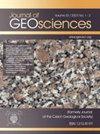外喀尔巴阡山脉西部(捷克摩拉维亚东南部)中新世次火山岩的岩石成因
IF 1.3
4区 地球科学
Q3 GEOCHEMISTRY & GEOPHYSICS
引用次数: 3
摘要
在摩拉维亚东南部新近纪次火山岩中,形成了从斜辉石-角闪洞和角闪洞粗玄武岩到粗闪山岩,再到黑云母-角闪洞粗英岩的大量岩脉和漆膜岩。粗达英安岩和粗达安山岩中很少出现直径达70 cm的白色和黑色堆积辉长岩和玄武岩包体。母岩浆在空间上沿与内兹德尼斯断裂相关的张性裂缝上升,但可能从未到达地表。主要元素组成(如SiO2 44-62 wt. %, mg# 20-65)和微量元素组成的范围可以通过岩浆混合和混合以及随后的分离结晶来解释。矿物化学表明基性矿物组成变化有限。透辉石斑晶的XMg值范围较窄(0.65 ~ 0.84),通常呈正常分带,富mg小核和富fe边缘。长柄英安岩和辉长岩包体中的云母组成相似,XFe为0.36 ~ 0.43,IVAl为2.44 ~ 2.59。玄武岩、粗玄武岩和粗玄武岩样品中的角闪石在化学上也相对均匀(XMg 0.51-0.86, Si 5.78-6.55)。粗面玄武岩和粗面山岩中角闪孔斑晶的化学成分表明该岩浆体系在深度32 ~ 21 km处存在多阶段结晶。短道英英岩和辉长岩包体中角闪石中Si、Ti、VIAl、XMg含量的系统变化可以用浅层岩浆储层(~20 ~ 10 km)的分异结晶来解释。本文章由计算机程序翻译,如有差异,请以英文原文为准。
Petrogenesis of Miocene subvolcanic rocks in the Western Outer Carpathians (southeastern Moravia, Czech Republic)
Neogene subvolcanic rocks in southeastern Moravia form numerous dykes and laccoliths, ranging from clinopyroxene–amphibole and amphibole trachybasalt, through trachyandesite, to biotite–amphibole trachydacite. Leucocratic and melanocratic cumulate gabbro and basalt enclaves up to 70 cm in diameter are rarely present, respectively, within the trachydacite and trachyandesite. The parental magmas rose along tensional fissures spatially related to the Nezdenice Fault but probably never reached the surface. The range of major (e.g., SiO2 44–62 wt. %, mg# 20–65) and trace-element compositions can be explained through magma mixing and mingling and subsequent fractional crystallization. Mineral chemistry shows limited compositional variation of mafic minerals. Diopside phenocrysts indicate narrow ranges of XMg (0.65–0.84) and usually display normal zoning with small Mg-rich cores and Fe-rich rims. Phlogopites from the trachydacite and gabbro enclaves show a mutually similar composition (XFe 0.36–0.43 and IVAl 2.44–2.59). Amphiboles from individual samples of basalt, trachybasalt and trachyandesite are likewise chemically relatively homogeneous (XMg 0.51–0.86, Si 5.78–6.55). Chemical compositions of amphibole phenocrysts from the trachybasalts and trachyandesites indicate multi-stage crystallization at depth of 32 to 21 km for this magmatic system. Systematic changes in Si, Ti, VIAl, XMg contents in amphiboles from trachydacites and gabbro enclaves can be explained by fractional crystallization in a shallower magma reservoir (~20–10 km).
求助全文
通过发布文献求助,成功后即可免费获取论文全文。
去求助
来源期刊

Journal of Geosciences
GEOSCIENCES, MULTIDISCIPLINARY-MINERALOGY
CiteScore
2.30
自引率
7.10%
发文量
15
审稿时长
>12 weeks
期刊介绍:
The Journal of Geosciences is an international peer-reviewed journal published by the Czech Geological Society with support from the Czech Geological Survey. It accepts high-quality original research or review papers dealing with all aspects of the nature and origin of igneous and metamorphic rocks. The Journal focuses, mainly but not exclusively, on:
-Process-oriented regional studies of igneous and metamorphic complexes-
Research in structural geology and tectonics-
Igneous and metamorphic petrology-
Mineral chemistry and mineralogy-
Major- and trace-element geochemistry, isotope geochemistry-
Dating igneous activity and metamorphic events-
Experimental petrology and mineralogy-
Theoretical models of igneous and metamorphic processes-
Mineralizing processes and mineral deposits.
All the papers are written in English, even though they may be accompanied by an additional Czech abstract. Each contribution is a subject to peer review by at least two independent reviewers, typically at least one from abroad. The Journal appears 2 to 4 times a year. Formally it is divided in annual volumes, each of them including 4 issues.
 求助内容:
求助内容: 应助结果提醒方式:
应助结果提醒方式:


